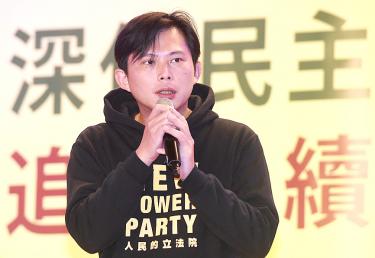New Power Party Executive Chairman Huang Kuo-chang (黃國昌) and other advocates yesterday said that, despite US President Barack Obama’s comments, independence is still a necessity for Taiwan.
Obama on Friday said that Taiwanese have “a high degree of self-determination” and that “Taiwanese have agreed that as long as they’re able to continue to function with some degree of autonomy, that they won’t charge forward and declare independence.”
Obama’s ideas about Taiwan seem to be entrenched in a decades-old mindset, which was first forged when the US switched official diplomatic recognition from Taiwan to China and adopted the “one China” policy, Huang said at a seminar held to discuss issues pertaining to Taiwanese independence organized by the Taiwan Association of University Professors.
After years of democratization, Taiwan is a considerably different nation from when the US was shaping its “one China” policy, Huang said.
“There is a large gap between Obama’s speech and the Taiwanese perception [of reality]. Taiwan is already a sovereign nation, but many countries still do not recognize it. To break out from that predicament, we have to work toward normalizing the nation,” Huang said.
“Obama, as the US president, should understand the values of democracy, and those values entitle Taiwanese to the right to make Taiwan a normalized country,” he said.
Calling on all political parties in the US to support Taiwan, Huang encouraged the incoming administration of US president-elect Donald Trump to re-examine Washington’s “one China” policy and treat Taiwan like a true ally instead of a bargaining chip.
Academia Sinica assistant research fellow Wu Rwei-ren (吳叡人) said Obama’s remarks indicated no departure from previous US policies on Taiwan, whereas both houses of the US Congress in July passed legislation reaffirming the “six assurances,” marking an improvement in Taiwan-US relations.
The “bidding” between Obama and Trump over Taiwan-US relations forced Obama to reiterate the US’ commitment to Taiwan, effectively preventing China from interfering in Taiwan’s de facto independence, Wu said.
Although Trump might use Taiwan as a bargaining chip against China, the deals he wanted to reach — including China making concessions over trade and the disputed South China Sea — are hardly attainable, so Trump’s move could help stabilize Taiwan’s status and create a rare opportunity for reassessing the US’ “one China” policy, Wu said.
Thus far, Taiwan is the “small winner” of the Obama-Trump exchange, as the nation has succeeded in gaining rare international attention without being a troublemaker, he said.
Taiwanese independence is absolutely necessary given that Chinese expansionism and imperialism is on the rise and Trump’s administration might implement unorthodox foreign policies, Wu said.
“Under China’s economic and military threat, Taiwan’s efforts to deepen its democracy have been deterred to the point that the nation’s de facto independence could be compromised,” Wu said.
Apparent attempts by China to interfere with Taiwan’s autonomy include military activities, economic invasion, collusion with Taiwanese politicians and businesses and acquisitions of Taiwanese media to manipulate society, he said.
Other attempts include restricting Taiwan from amending the Constitution and the Referendum Act (公民投票法) to attain a direct democracy.
The Democratic Progressive Party, which on Friday last week raised a motion to shelve proposals for a referendum on amending the constitutional definition of Taiwan’s territories, seems to be cooperating with Beijing to prevent a direct democracy, he said.
While the Additional Articles of the Constitution stipulate that a proposal passed by the Legislative Yuan on territorial changes should be ratified by a referendum, it was considered by the government to be “too controversial and too provocative” to be written into law, suggesting China’s influence over Taiwan’s democratic development, Huang said.
Source: Taipei Times - 2016/12/19





















